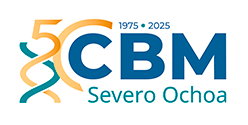Scientific Program
Interactions with the environment
RESEARCH GROUP
Regulation and function of proinflammatory mediators and their involvement in immune and inflammatory mediated diseases

Manuel Fresno
Our aim is understanding immune Development since its alteration may lead to inflammatory Diseases. We address the role of the TCFL5, in inflammageing iimmunosenescence, and related disorders. TCFL5 has an important role in spermatogenesis, leukemia and colon cancer and preliminary data indicate that in Tcfl5-deficient animals leucopoiesis, is compromised, being especially relevant in aged animals.
Research
We analyzed the involvement of Toll-like receptors (TLR)/NFAT/Cyclooxygenase (Cox)-2/prostaglandins (PGs) in the immune system and inflammatory pathologies as Obesity, Cancer and Sepsis. PGF2α negatively regulates adipocyte differentiation through transcription factor NFAT. Moreover, NFATc4 deficiency plays a key role in obesity and fatty acid metabolism. Cox-2 inhibitors reduce cancer but have side effects. As an alternative, we have analyzed genes regulated by Cox2 that may provide a protooncogenic advantage. Among those, we identified, mPGES1 is involved in increased growth and induced through a PGF2α/Egr-1 mechanism. Moreover PGF2α induced TGFβ-PMEPA1 pathway, which is a critical mediator of epithelial plasticity and ovarian carcinoma progression. Dual-specificity phosphatase 10 (Dusp10) controls stress response to serum deprivation and confluence arrest and binds and dephosphorylates Yes-associated protein 1 (YAP) in colorectal cancer progression.
TCFL5, initially cloned by us as CHA, is a member of the bHLH transcription factor family. We found that human TCFL5 gene locus is a complex with 4 isoforms. Besides, we performed interactome analysis of all TCFL5 isoforms. The 2 major isoforms, TCFL5 and CHA, will result from alternative promoter usage and differential transcription, rather than from gene splicing. We have confirmed binding to those promoters of Notch1, Egr1 and c-Myc. We found that CHA isoform, but not TCFL5 can bind to c-Myc and repressed its transcriptional activity in several cancer cell lines. Notch1 can bind to TCFL5 promoter and induce TCFL5 isoform. On the contrary, c-Myc can induce both TCFL5 and CHA transcription. We have also defined a set of genes regulated by TCFL5/CHA in leukemia cell lines and established its role in the prognosis and development of B-and T-acute lymphoblastic leukemia and in normal hematopoiesis.
The protozoan parasite, Trypanosoma cruzi causes Chagas’ disease. We addressed the impact of T. cruzi genetic variability in the clinical outcome and immunopathology of the disease. We addressed the role that T cell CD4+ subsets, myeloid subclasses including myeloid-derived suppressor cells (MDSC) have in the immunopathogenesis with special focus on myocarditis, both in animal models and in patients, which differ depending of the infecting strain. To address this enormous complexity we used a system biology multiomic approaches including genomics, transcriptomic, metabolomics, etc. We have found many metabolic, miRNA and mRNA transcription alterations in T. cruzi infection suggesting a stressful condition in the heart. Serum miRNAS are excellent Biomarkers of Chagas’ disease progression. Besides, we defined Slamf1 as a new T. cruzi receptor.
Group members

Manuel Fresno Escudero
Lab.: 226 Ext.: 4565
mfresno(at)cbm.csic.es

María Magdalena Sanz Rosello
Lab.: 226 Ext.: 4572/ 914978604
magdalena.sanz(at)uam.es

Konstantinos Stamatakis Adriani
Lab.: 226 Ext.: 4572
kstamatakis(at)cbm.csic.es

Antonio Lahera Alonso
Lab.: 327 Ext.: 4653
a.lahera(at)cbm.csic.es

Sergio Polo Nicoli
Lab.: 226 Ext.: 4572

Carolina Maroto González
Lab.: 226 Ext.: 4572
cmaroto(at)cbm.csic.es
Selected publications
Title
Authors
Title
Authors
Title
Authors
Title
Authors




